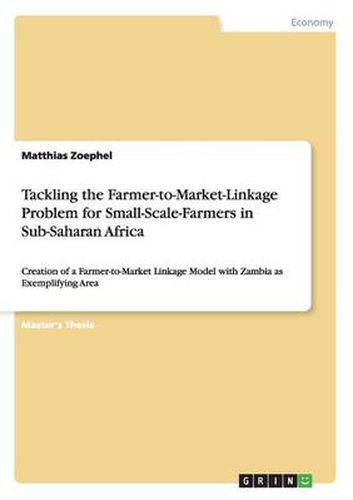Readings Newsletter
Become a Readings Member to make your shopping experience even easier.
Sign in or sign up for free!
You’re not far away from qualifying for FREE standard shipping within Australia
You’ve qualified for FREE standard shipping within Australia
The cart is loading…






Master’s Thesis from the year 2011 in the subject Economics - Case Scenarios, grade: A, University of Applied Sciences Chur, language: English, abstract: African small-scale farmers are inadequately linked to markets to sell their harvested produce. On the one hand this is mainly because farmers are unable to produce according to what is demanded by buyers and on the other hand due to intermediary constraints. This current lack of adequate market linkages prevents farmers to sell their surplus production profitably. While this problem has been widely recognized by NGOs and governmental institutions, little improvements have been made so far. Literature fails to provide an overview of this problem that includes all variables affecting farmers and their linkage to markets. Zambia in particular has received minor consideration in the current literature concerning this problem. Therefore, two NGOs, namely Henwood Foundation and NAK Karitativ, have chosen this Master Thesis to create a farmer-to-market linkage model that incorporates all variables affecting farmers from being inadequately linked to markets while focus is placed on those variables that are amendable to influence by NGOs rather than external variables. The literature review in the following section two indicates how severe the market linkage problem actually is for small-scale farmers and what possibilities there are to tackle this dilemma. Based on the literature review, the research problem, its goal and its objectives as well as the data collection methods are specified in section three. Section four will provide an introduction to Zambia as well as to Western Province, a state in Zambia, and to Mongu District, a region in Western Province which received the geographical focus of this thesis. Building on this, the farmer-to-market linkage model will receive attention. Section five and six point out preconditions that determine agricultural output, which ultimately decides how well farmers can be linked
$9.00 standard shipping within Australia
FREE standard shipping within Australia for orders over $100.00
Express & International shipping calculated at checkout
Master’s Thesis from the year 2011 in the subject Economics - Case Scenarios, grade: A, University of Applied Sciences Chur, language: English, abstract: African small-scale farmers are inadequately linked to markets to sell their harvested produce. On the one hand this is mainly because farmers are unable to produce according to what is demanded by buyers and on the other hand due to intermediary constraints. This current lack of adequate market linkages prevents farmers to sell their surplus production profitably. While this problem has been widely recognized by NGOs and governmental institutions, little improvements have been made so far. Literature fails to provide an overview of this problem that includes all variables affecting farmers and their linkage to markets. Zambia in particular has received minor consideration in the current literature concerning this problem. Therefore, two NGOs, namely Henwood Foundation and NAK Karitativ, have chosen this Master Thesis to create a farmer-to-market linkage model that incorporates all variables affecting farmers from being inadequately linked to markets while focus is placed on those variables that are amendable to influence by NGOs rather than external variables. The literature review in the following section two indicates how severe the market linkage problem actually is for small-scale farmers and what possibilities there are to tackle this dilemma. Based on the literature review, the research problem, its goal and its objectives as well as the data collection methods are specified in section three. Section four will provide an introduction to Zambia as well as to Western Province, a state in Zambia, and to Mongu District, a region in Western Province which received the geographical focus of this thesis. Building on this, the farmer-to-market linkage model will receive attention. Section five and six point out preconditions that determine agricultural output, which ultimately decides how well farmers can be linked